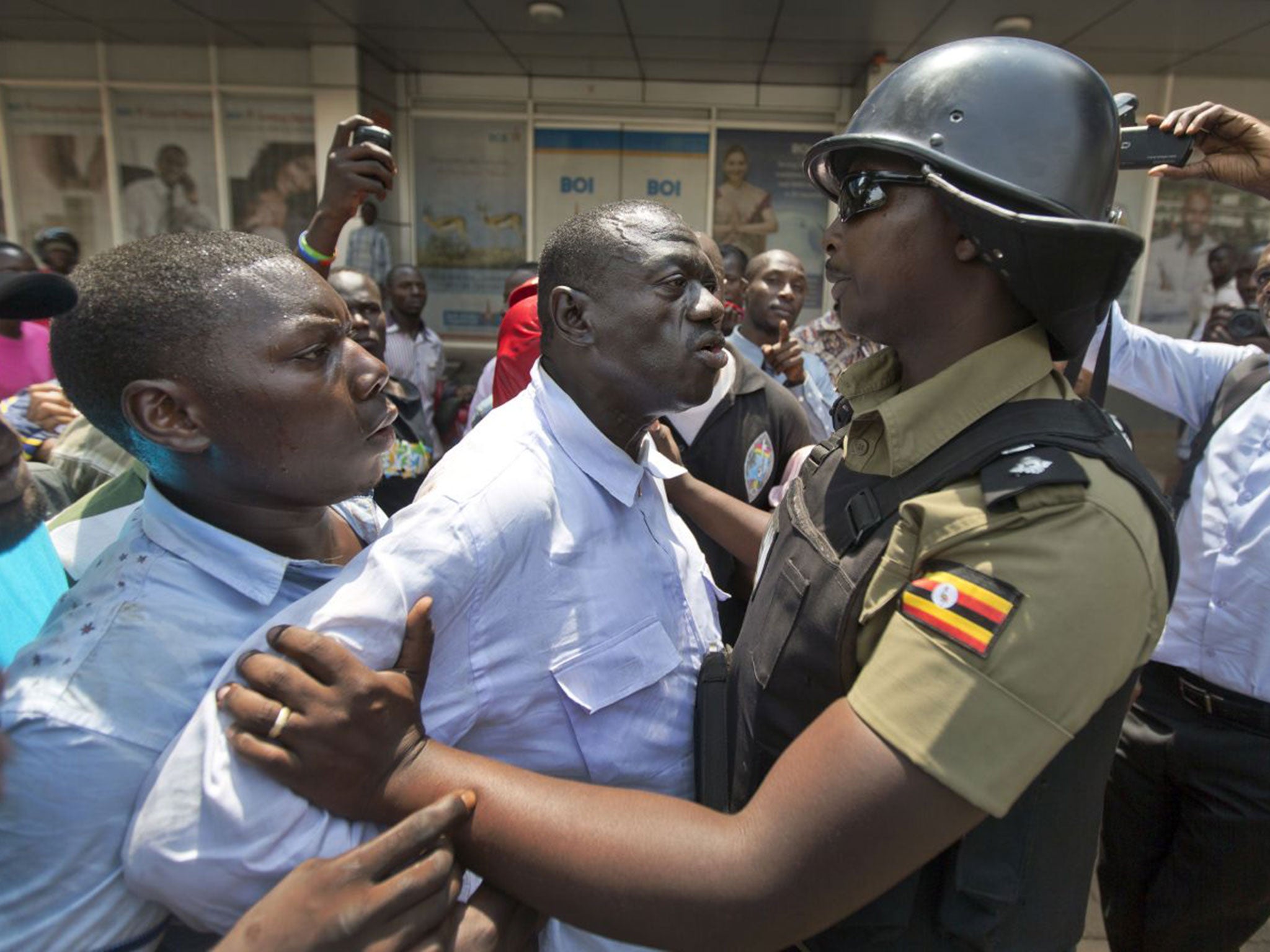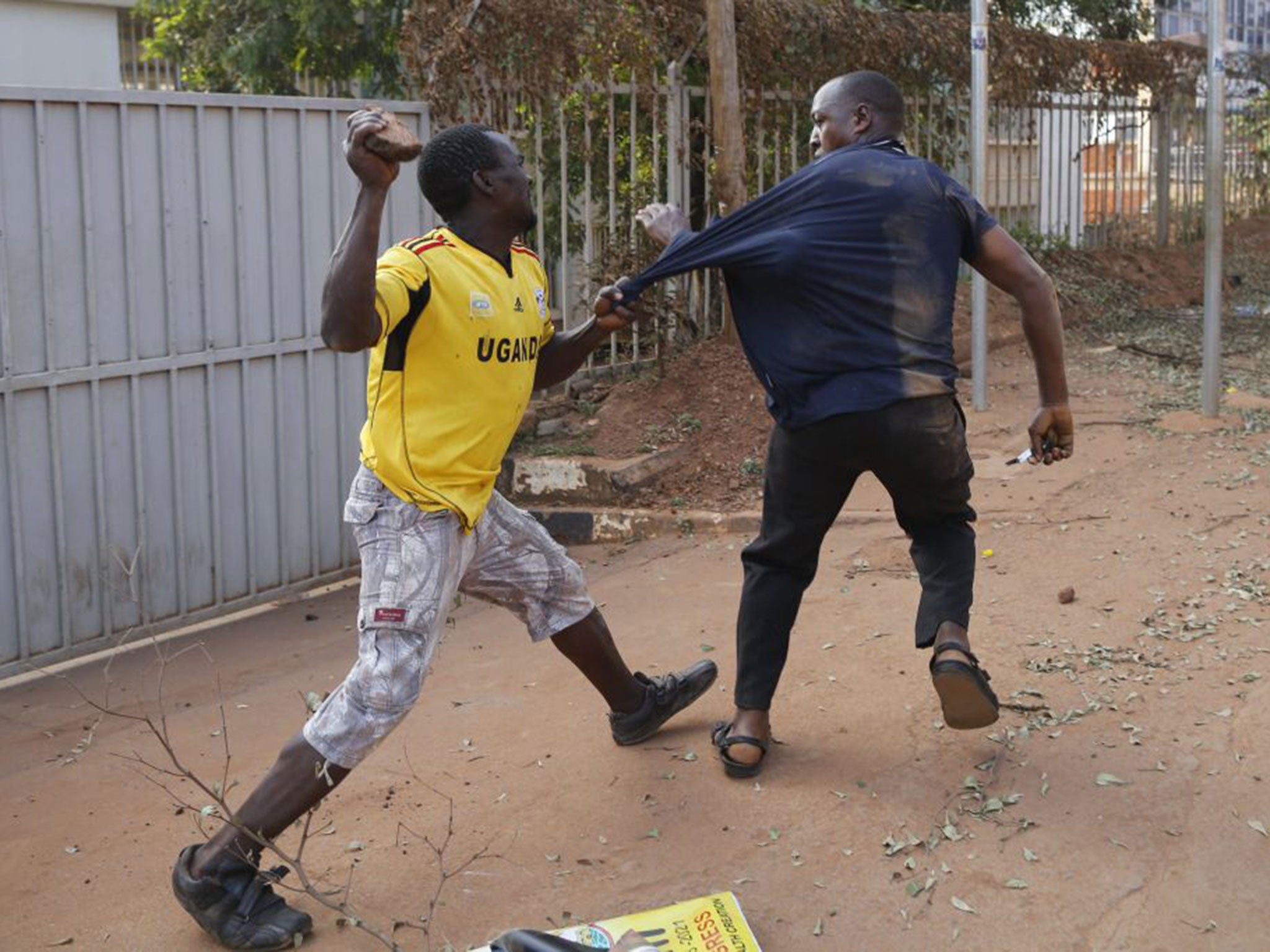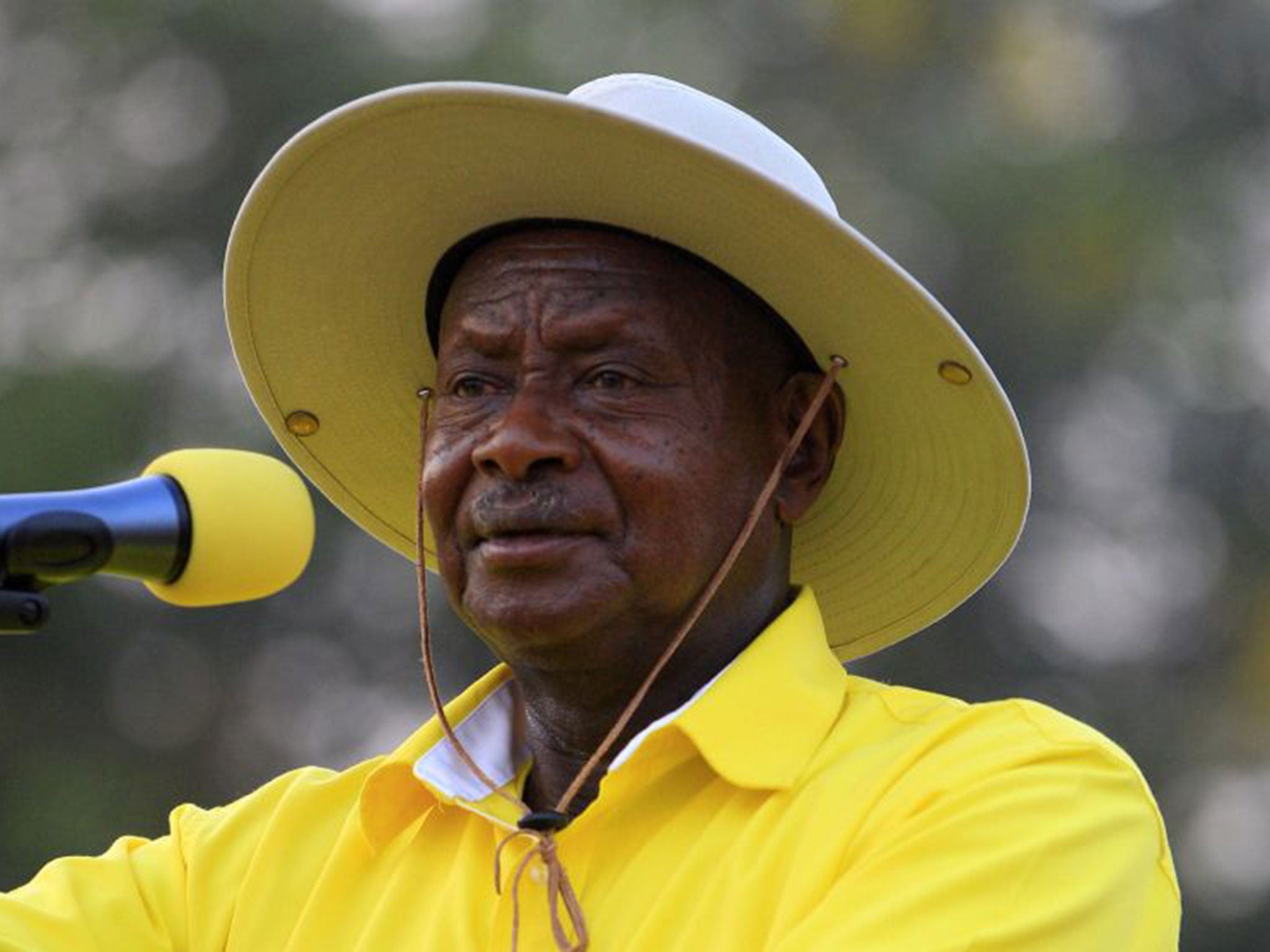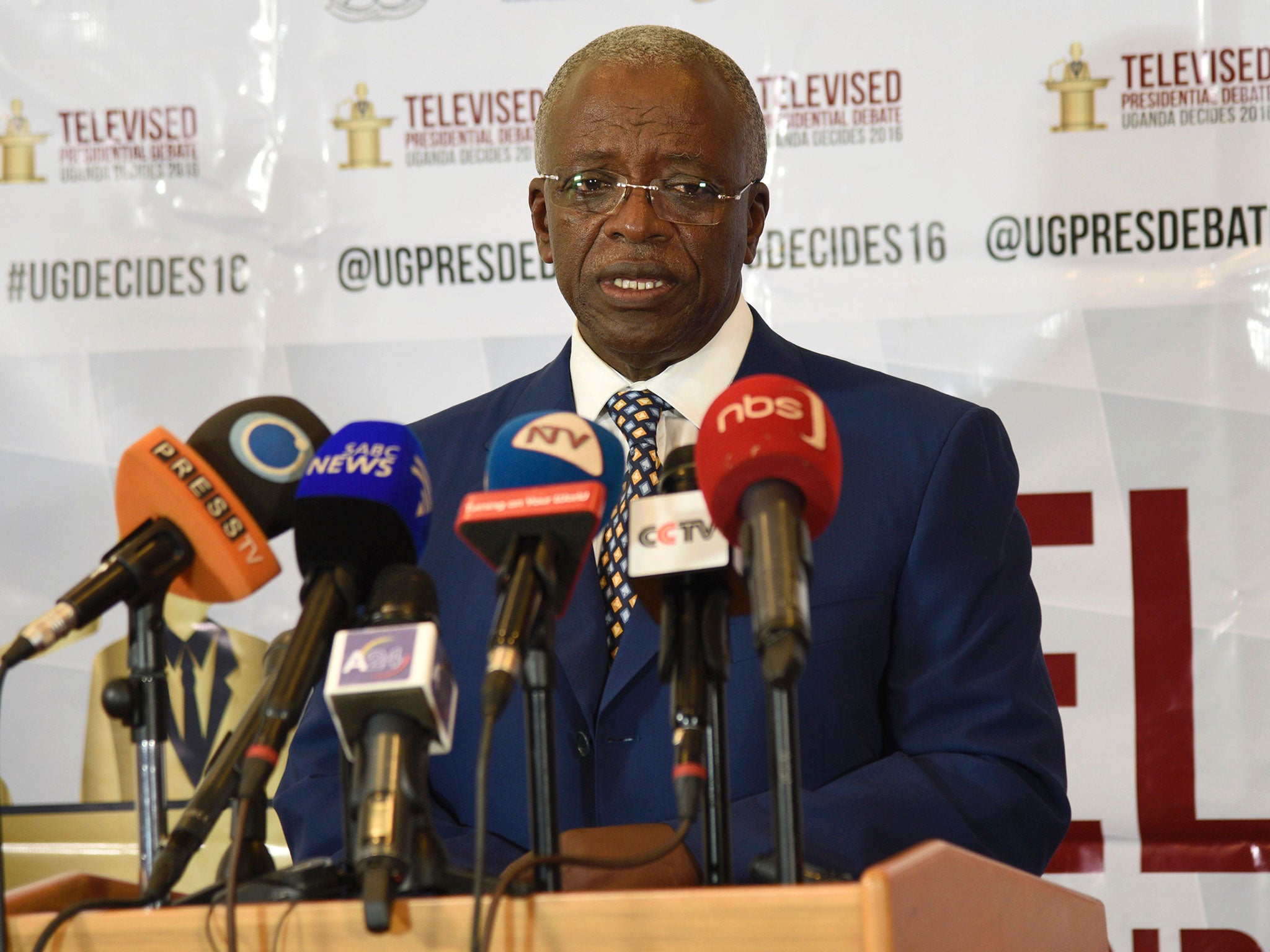Uganda election: On patrol with the ‘preventers’ - but just what are these unpaid vigilantes for?
Ugandan President Yoweri Museveni says they are there to fight crime, but his political opponents fear they will make sure this week’s poll returns him to power

Every evening, Charles Lwanga reports for duty at the local police station. He and 15 of his fellow “crime preventers”, armed with wooden batons and with their faces partially masked, set off with four policemen on patrol in a nearby village, looking out for gamblers, drinkers and general troublemakers.
With tensions building ahead of Thursday’s presidential election, the recruitment of 1.6 million civilian vigilantes has alarmed President Yoweri Museveni’s critics, who argue that their purpose is not to fight crime, but to shore up the Ugandan leader’s 30-year regime as he looks to secure another five-year term.
The arrest of the leading opposition candidate, Kizza Besigye, as he campaigned in the capital, Kampala, reinforced fears of a troubled election, already marred by allegations of intimidation, a state-led crackdown on the media and potential rigging.
After three decades in power, this is a pivotal election for Mr Museveni, 71. With only the older generation still clearly recalling the despotic tyrannies of Milton Obote and Idi Amin in the 1960s and 1970s, the argument that his continued stewardship is needed to prevent Uganda from sliding back into perpetual conflict is losing its potency.

“The president is seeing a lot of opposition, and so he’s making sure people are threatened,” said Alex Lapila, a 53-year-old farmer outside Kampala. “Thirty years has been enough.”
Although recent opinion polls place Mr Museveni well ahead of his main rivals – the fourth-time presidential contender Kizza Besigye and the former prime minister Amama Mbabazi – at least two polls suggest he would barely scrape the 51 per cent of the votes that he will need to win outright. If he fails, he will face an unprecedented second round run-off against one of his two opponents. The emergence of Mr Mbabazi as an alternative opposition candidate, pitting the president against two credible contenders, has raised the stakes in this race, but it is Mr Besigye who draws the loudest support.
One way or another, Mr Museveni is expected to win, and Uganda’s wily leader is accused of using every tool at his disposal – from intimidation to buying votes – to ward off defeat at this week’s polls.
“What is different about this election is that the biggest majority of voters will be youth. They want change,” says Zahara Nampere, a lecturer at Kampala’s Makerere University. “They have never seen Uganda without Museveni so they don’t remember the chaos.”
What the Ugandan police call just another community policing scheme could play a determining role in whether the country’s elections pass off peacefully or not, analysts warn.
For Mr Lwanga, 37, his stint in the “crime preventers” has provided a sense of purpose. He is not paid, but the police have vaguely promised goats and chickens as recompense, and he is holding out for a police job after the elections.
He bridles at suggestions from civil rights groups that he and his fellow vigilantes are pushing a political agenda. “Our job is just to keep law and order, and prevent any fighting,” he says. “We will keep Uganda safe until the election is done.”
Officials in Kampala insist the patrols are a type of community policing as seen in the West. “We borrowed [the idea] from the UK. It’s what you call Neighbourhood Watch,” said Patrick Onyango, a police spokesman. “We cannot be everywhere… Crime has come down.”
But both the timing and the numbers (30 “preventers” in every one of Uganda’s 56,000 villages) have raised eyebrows. A particular concern is the vigilantes’ ill-defined role: are they limited to stopping crime, or will they play a part in manning polling stations and quashing dissent if there are post-election protests?

“This is [happening] in a highly sensitive climate,” says Kristian Schmidt, the European Union’s ambassador to Uganda. “Can these young people be controlled? They are given the impression they can do A, B or C, but it’s unclear where their powers stop.”
A report last month by several human rights groups, including the US-based Human Rights Watch, detailed alleged abuses by the crime preventers, among them extortion and torture. Others would go door to door asking people about their political allegiances and warning them against voting for the opposition. “Undisciplined and unaccountable recruits” risk becoming the “eyes and muscle of the ruling part in every village”, HRW’s Africa researcher Maria Burnett warned.
It has by all accounts been a difficult campaign for the opposition. Mr Besigye’s arrest came after police tried to stop his rally in the capital.
“Museveni has declared all public places in Kampala central a ‘no-go area’ for [the] opposition,” Mr Besigye’s spokesman Semujju Nganda told the Daily Monitor newspaper, saying they had hoped to hold a rally in a central football stadium. “Police blocked us. This has left us with no choice but to address voters on the streets and roads.”
Even before this, he had been repeatedly placed under house arrest, held up on the way to rallies, had rallies dispersed with tear gas, and had “stinger” tyre cutters thrown in front of his convoy.
Mr Mbabazi has also had a tough campaign, and has accused the authorities of kidnapping his Go Forward campaign’s head of security two months ago, a charge the police deny.
“I’ve had people [of mine] killed. They arrest our supporters every day using one pretext or another. I’ve been tear gassed, once even shot at with live bullets,” Mr Mbabazi told The Independent. “It’s unlikely any police officer would shoot at me without sanction from the top.”
A former confidant of the president, Mr Mbabazi is seen by some as the biggest threat to Mr Museveni. Although he has failed to gain the support his candidacy once promised, as a regime insider who claims knowledge of how previous elections have been rigged he could prove an embarrassment to the government.

“The only challenge for the incumbent is that of the man who understands the system – and Museveni doesn’t know what he is going to do,” said Edward Muhumuza, a Ugandan journalist, referring to a potential challenge to the election result. “They know how to handle Besigye.”
After the 2011 polls Mr Besigye, accusing the state of rigging elections, mobilised mass protests – demonstrations that were met with lethal force and quickly dispersed.
There is every indication that the government would do the same again. Justine Lumumba, the secretary-general of the ruling NRM party, warned citizens earlier this month that the state would “kill your children” in the event of protest.
But protest seems likely, given the scrutiny of the electoral process and with the Electoral Commission tainted by past allegations of vote rigging. Mr Besigye has openly hinted he will defy a Museveni win, raising the prospect of clashes between opposition supporters, some of whom have formed into their own militia-style groups, and those who support the president, possibly the crime preventers.
“Crime preventers are in my view agencies of violence. The groups being mobilised by the opposition … are also agencies of violence,” says Nicholas Opiyo, head of the Kampala-based rights group Chapter Four, warning that unless they are disbanded, the country could be “engulfed” by violence after the elections.
Others are not so sure. Bernard Tabaire of the African Centre for Media Excellence suggested the huge numbers of crime preventers that have been recruited make it more difficult for the opposition to amass support. Crucially, the president is believed to retain almost total control of the armed forces, having placed his own son, Brigadier Muhoozi Kainerugaba, in charge of the country’s special forces.
“Museveni still has the loyalty of security services and they will do whatever it takes to crush protests,” Mr Tabaire said. “The opposition doesn’t have what it takes to sustain any civil disobedience.”
Meanwhile, Mr Lwanga, the crime preventer, said he was preparing for the worst. “We shall fight,” he says. “It has been discussed. They told us if people start misbehaving, you have to join ranks and give the police manpower. So long as it is not killing … I’m prepared.”
Ugandan election: The contenders
Yoweri Museveni
Uganda’s 71-year-old President has held power for 30 years, and shows no intention of relinquishing control soon. He swept into power in 1986 after a five-year guerrilla war, famously writing the same year that leaders who overstay their welcome are at the root of Africa’s problems. In 2001, he declared his intention to step down at the next elections, only to change the constitution when the time came in 2006, to let him run for a third term. In an attempt to appeal to the youth vote, he has released his own rap before this month’s polls.
Kizza Besigye
Running for the fourth time against Mr Museveni, Mr Besigye, 59, fought with the President in the bush war against Milton Obote between 1981 and 1986, when he was also his personal physician. He broke with the regime shortly before the 2001 elections, and after his arrest in connection with treason in June of that year, fled into exile for four years. He has repeatedly accused the state of rigging election results, and said recently that he had been arrested 43 times since the 2011 polls.
Amama Mbabazi
Sacked by Mr Museveni as Prime Minister in 2014, Mr Mbabazi, 67, is running as an independent. He is seen as less radical than Mr Besigye, promoting many of the same policies as the current President. Some opposition voters view him as tainted by his close ties to the regime, and a vote for him is widely seen as a vote taken from Mr Museveni. He has said he wants to be a transitional president only, before handing power to a new generation of leaders.
Join our commenting forum
Join thought-provoking conversations, follow other Independent readers and see their replies
Comments